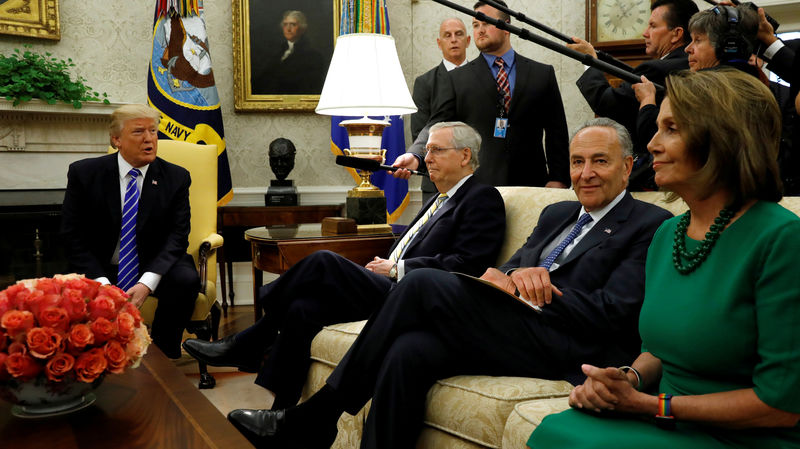By David Morgan and Susan Cornwell
WASHINGTON (Reuters) - U.S. Republican party lawmakers warned on Friday that President Donald Trump’s legislative deal with Democrats to help hurricane victims and keep the government running for another three months could complicate his next big priority - tax reform.
Trump's sudden shift in strategy hands a clear victory to Senate Democratic leader Chuck Schumer and House Democratic leader Nancy Pelosi and that could slow the Republicans' legislative agenda, they said.
“This kind of creates complications relative to tax reform,” said Representative Ryan Costello from Pennsylvania. “It seems to me that there’s an element of unpredictability from one issue to the next and this week is sort of a reflection of that.”
“There was a lot of work going into how this was going to take shape in September. And that was entirely undermined … seemingly very spontaneously.”
Following Trump's deal with Democratic leaders, the House of Representatives on Friday approved legislation that provides $15.25 billion in emergency disaster aid for the victims of Hurricane Harvey, which battered coastal areas of Texas and Louisiana last week, and Hurricane Irma, which is expected to pound Florida in coming days.
Already approved by the Senate on Thursday, the deal also raises the U.S. government's debt ceiling and allows it to continue financing federal spending programs until Dec. 8, the new deadline for a deal on both issues.
But some Republicans fear the Democrats will be able to use their negotiating clout in early December to resist changes on key tax issues, especially the corporate tax rate, which Trump wants to cut from 35 percent to 15 percent.
Republican Senator Ben Sasse said the experience of watching Trump empower Democrats had been "embarrassing" for a Republican-controlled Congress and that the deal made Schumer "the most powerful man in America."
Sasse was one of 17 Senate Republicans who voted against the deal on Thursday. In the House, all 90 "no" votes came from Republicans but the deal passed comfortably with 183 Democrats and 133 Republicans in favor.
The White House said Trump’s shift in strategy this week clears away complicated issues like the debt ceiling and government funding, both of which had to be resolved in September, so Congress can concentrate more fully on tax reform, which Republicans want to complete by the end of the year.
After the failure of Republican efforts to overturn former President Barack Obama’s Affordable Care Act in July, Trump and lawmakers need a legislative victory to shore up their hopes of maintaining Republican majorities in next year’s midterm elections.
FRUSTRATION
Some House Republicans are already frustrated by a lack of details on tax reform from the administration. They hope to see more as soon as next week, though some are skeptical.
“My expectations are low. I think if they had something big they’d be floating elements of it now,” said Representative Darrell Issa.
How House Republicans respond to the tax plan will help determine the challenges they may face passing a fiscal year 2018 budget resolution that is critical to the Republican strategy for tax reform.
The budget contains a procedural rule that would allow Republicans to enact tax legislation with a simple majority in the Senate, which they control by a 52-48 margin.
Republican aides said House leaders had expected to bring the budget to the floor next week, but the document now needs changes to include government revenue projections that take into account current tax policy and the failure to repeal Obamacare, aides say.
Members of the conservative House Freedom Caucus, a formidable bloc in the House, have said they will not support the budget until they see the tax reform plan and want the resolution to contain more cuts to federal spending than the $203 billion over a decade that it already contains.
It was not clear whether the budget resolution could now suffer from conservative anger over Friday’s vote. Many conservatives have long called for lawmakers to couple any measures that raise the U.S. debt ceiling with reforms to cut spending.
The deal that passed on Friday did the opposite by attaching an increase in the debt ceiling to more spending to keep the government open, as well as adding money for hurricane relief without making any spending cuts elsewhere.
"I love President Trump and I’m with him probably 90 or 95 percent of the time. But I don’t think it’s appropriate to raise the debt ceiling with a $19 trillion public debt and not have any effort to change the way we spend money here in Washington," said Joe Barton, a House Freedom Caucus member.
Mark Meadows, who chairs the House Freedom Caucus, said he did not feel betrayed by Trump and that the legislation was a "unique situation" brought about by the massive storm damage in Texas and Louisiana.

"Because of hurricane relief, there wasn’t a whole lot of options," Meadows said on MSNBC. But, he added: "Our grassroots are very confused."